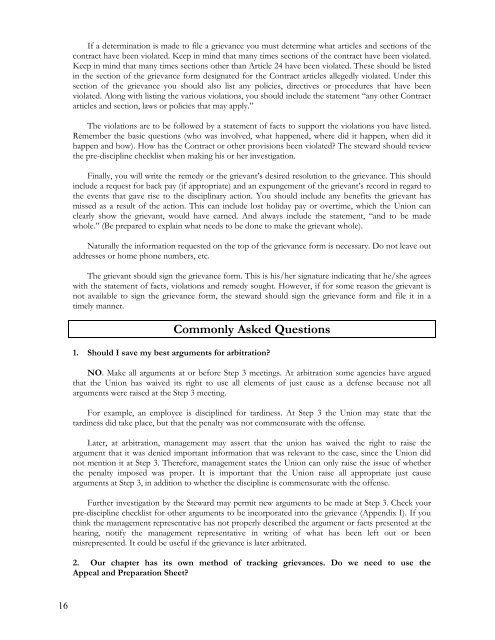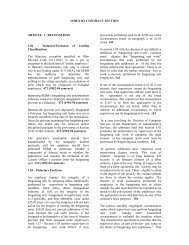Download the Grievance Guide - OCSEA
Download the Grievance Guide - OCSEA
Download the Grievance Guide - OCSEA
Create successful ePaper yourself
Turn your PDF publications into a flip-book with our unique Google optimized e-Paper software.
If a determination is made to file a grievance you must determine what articles and sections of <strong>the</strong><br />
contract have been violated. Keep in mind that many times sections of <strong>the</strong> contract have been violated.<br />
Keep in mind that many times sections o<strong>the</strong>r than Article 24 have been violated. These should be listed<br />
in <strong>the</strong> section of <strong>the</strong> grievance form designated for <strong>the</strong> Contract articles allegedly violated. Under this<br />
section of <strong>the</strong> grievance you should also list any policies, directives or procedures that have been<br />
violated. Along with listing <strong>the</strong> various violations, you should include <strong>the</strong> statement “any o<strong>the</strong>r Contract<br />
articles and section, laws or policies that may apply.”<br />
The violations are to be followed by a statement of facts to support <strong>the</strong> violations you have listed.<br />
Remember <strong>the</strong> basic questions (who was involved, what happened, where did it happen, when did it<br />
happen and how). How has <strong>the</strong> Contract or o<strong>the</strong>r provisions been violated? The steward should review<br />
<strong>the</strong> pre-discipline checklist when making his or her investigation.<br />
Finally, you will write <strong>the</strong> remedy or <strong>the</strong> grievant’s desired resolution to <strong>the</strong> grievance. This should<br />
include a request for back pay (if appropriate) and an expungement of <strong>the</strong> grievant’s record in regard to<br />
<strong>the</strong> events that gave rise to <strong>the</strong> disciplinary action. You should include any benefits <strong>the</strong> grievant has<br />
missed as a result of <strong>the</strong> action. This can include lost holiday pay or overtime, which <strong>the</strong> Union can<br />
clearly show <strong>the</strong> grievant, would have earned. And always include <strong>the</strong> statement, “and to be made<br />
whole.” (Be prepared to explain what needs to be done to make <strong>the</strong> grievant whole).<br />
Naturally <strong>the</strong> information requested on <strong>the</strong> top of <strong>the</strong> grievance form is necessary. Do not leave out<br />
addresses or home phone numbers, etc.<br />
The grievant should sign <strong>the</strong> grievance form. This is his/her signature indicating that he/she agrees<br />
with <strong>the</strong> statement of facts, violations and remedy sought. However, if for some reason <strong>the</strong> grievant is<br />
not available to sign <strong>the</strong> grievance form, <strong>the</strong> steward should sign <strong>the</strong> grievance form and file it in a<br />
timely manner.<br />
Commonly Asked Questions<br />
1. Should I save my best arguments for arbitration?<br />
NO. Make all arguments at or before Step 3 meetings. At arbitration some agencies have argued<br />
that <strong>the</strong> Union has waived its right to use all elements of just cause as a defense because not all<br />
arguments were raised at <strong>the</strong> Step 3 meeting.<br />
For example, an employee is disciplined for tardiness. At Step 3 <strong>the</strong> Union may state that <strong>the</strong><br />
tardiness did take place, but that <strong>the</strong> penalty was not commensurate with <strong>the</strong> offense.<br />
Later, at arbitration, management may assert that <strong>the</strong> union has waived <strong>the</strong> right to raise <strong>the</strong><br />
argument that it was denied important information that was relevant to <strong>the</strong> case, since <strong>the</strong> Union did<br />
not mention it at Step 3. Therefore, management states <strong>the</strong> Union can only raise <strong>the</strong> issue of whe<strong>the</strong>r<br />
<strong>the</strong> penalty imposed was proper. It is important that <strong>the</strong> Union raise all appropriate just cause<br />
arguments at Step 3, in addition to whe<strong>the</strong>r <strong>the</strong> discipline is commensurate with <strong>the</strong> offense.<br />
Fur<strong>the</strong>r investigation by <strong>the</strong> Steward may permit new arguments to be made at Step 3. Check your<br />
pre-discipline checklist for o<strong>the</strong>r arguments to be incorporated into <strong>the</strong> grievance (Appendix I). If you<br />
think <strong>the</strong> management representative has not properly described <strong>the</strong> argument or facts presented at <strong>the</strong><br />
hearing, notify <strong>the</strong> management representative in writing of what has been left out or been<br />
misrepresented. It could be useful if <strong>the</strong> grievance is later arbitrated.<br />
2. Our chapter has its own method of tracking grievances. Do we need to use <strong>the</strong><br />
Appeal and Preparation Sheet?<br />
16

















